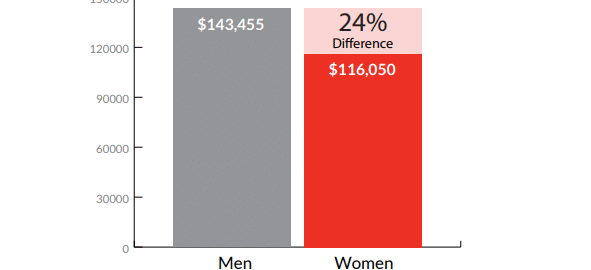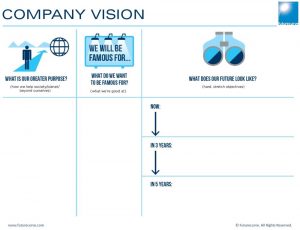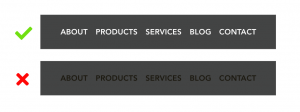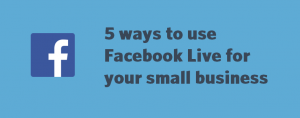The gender pay gap persists in marketing as well as many other careers. Here’s actionable advice on combatting it.
Year by year, our MarTech Salary and Career Survey has exposed a persistent pay gap between respondents identifying as women and respondents identifying as men. The gap is manifest right up to the C-suite. One question that arises is whether women should negotiate more aggressively for higher salaries or whether the job market should respond better to their skills and qualifications.
Of course, this issues goes way beyond marketing and marketing technology roles. Both EU and national governments prioritize gender pay gap reduction in their gender policies. But has there been tangible progress? Many would say, not enough.
The psychology behind the gender pay gap
Women who experience the gender pay gap regularly may become frustrated and feel helpless to change it. This frustration can quickly escalate into stress and depression.
Regrettably, research suggests that many women persist in attributing these circumstances to themselves instead of recognizing the need for reformative action from the system.
The link between the gender wage gap and depression/anxiety in women
A recent large scale survey from Columbia University reported a connection between women’s anxiety and gender pay gaps. From the executive summary: “The study authors suggest that these findings could indicate that underlying structural discrimination — rules and practices that disadvantage specific groups of individuals, such as women or ethnic minorities, and exemplified in this case by wage inequality — contributes to women’s disproportionate reports of depression and anxiety, particularly if women are internalizing discriminatory acts as a reflection of their low worth rather than that of biased institutional practices. “
Note that if women earn equal or more than their male counterparts, their risk for depression and anxiety becomes similar to that of men. Conversely, when female earnings fall below male ones, depression and anxiety risks increase more to than double.
The fear of asking for a raise
As a young entrepreneur, I believe the gender pay gap is not solely about employers exploiting women in tech. Women should become more self-assured and confident of the value they add to their field.
Based on my own observations, and five years of experience in managing positions, women tend to negotiate their salary during job offers less frequently than men do. I’d also been tackling this problem throughout my first three years of a corporate career. It wasn’t that an employer refused to give me more money. It was I who was afraid to ask for more generous pay due to a lack of confidence, impostor syndrome, and plenty of other prejudices.
The book “Women Don’t Ask: Negotiation and the Gender Divide” sheds light on the disparate experiences between men and women when it comes to initiating negotiations over what they want. According to research conducted, men are twice as likely as women to voice their demands and initiate negotiations directly.
There has also been progress made toward narrowing the gender gap among younger women. They become more assertive when asking for salary increases and are increasingly the main providers of income support to their families.
However, women are still a considerable distance from achieving equal pay through effective negotiation.
The gender pay gap for marketing professionals
Our 2023 MarTech Salary and Career Survey showed that women in marketing earned, on average, 24% less than men. That is an improvement on last year’s 30% disparity. Marketing technologists had an average salary of $ 138,000, with higher compensation available in larger companies and to more experienced professionals.
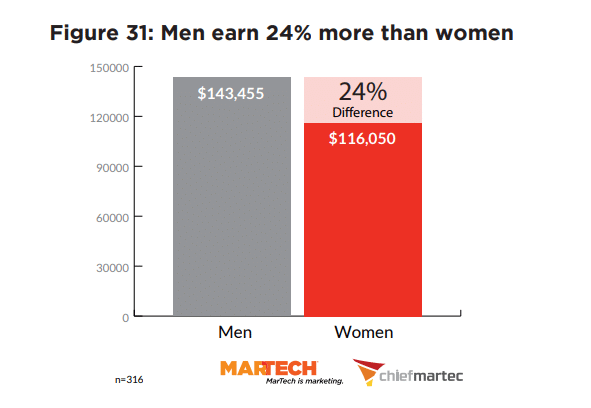
The takeaway: Although the pay gap persists, we can see women beginning to bridge it by taking action and showing their value.
In contrast, the gender pay gap across the healthcare industry must be eliminated on the governmental level as it demonstrates a horrible disparity. Health Affairs published a study demonstrating that women working as physicians with the same credentials and skills make an estimated $ 2 million less than their male counterparts earn over a simulated 40-year career, leading to an alarming gender pay gap in this profession.
What’s worse, a critical 64% gender pay gap in this sphere was noticed long before in 2016 by the Wall Street Journal.
The connection between gender and racial pay gap
Women of color face two simulatenous obstacles of course — racial and gender pay gaps.
Black and Hispanic, or Latina women earn less than men of the same race/ethnicity. Annual income for women also varies across different races. For example:
- White women — $ 47K per year.
- Black and African American — less than $ 40K.
- Latina women — less than $ 37K.
Contrastingly, Asians outearn any other ethnicities, with women having higher compensation than men.
How can women bridge the gap and earn more?
Reducing the gender pay gap requires a collaborative effort from individuals, employers, and policymakers alike. Although no single solution exists for closing this chasm, women can take steps to increase earnings and career opportunities.
Negotiating salary
According to Beverly De Marr’s “Negotiation and Dispute Resolution,” 20% of the women won’t negotiate their salaries at all. But they should. If they did, DeMarr suggests, they could earn around $ 7,000 more in the first year.
A woman who refuses to negotiate her salary will lose between $ 650,000 to $ 1,000,000 over a 45-year career.
So, negotiating salaries can have a substantial impact on women’s earnings over time. To prepare for negotiations, it is essential to conduct thorough market research and craft a compelling argument. The book “Getting to Yes: Negotiating Agreement Without Giving In” may help you with the latter.
By approaching negotiations with a clear and concise argument, women can take a proactive step toward narrowing the gender pay gap.
Building a network
Expanding their network within the industry can help women find new jobs or connect with employers. Joining social media like LinkedIn, participating in events, and joining organizations are all ways to improve professional contacts. Joan Budden, former President and CEO of Priority Health, has said: “I strongly believe that in order for women to rise in the workplace, we, as leaders, need to provide ample opportunities for networking and mentoring so professional relationships can flourish.”
Being more confident
Women who fail to reach their career goals often receive criticism that accuses them of lacking confidence despite demonstrating it through assertive behavior. Such comments may lower self-esteem and worsen the perception of confidence.
Women should remember that they are valuable members of their teams and that their contributions matter. By recognizing their worth and taking steps to build their confidence, they can position themselves for success. Ultimately, they make meaningful strides toward closing the gender pay gap, both in marketing and beyond.
The post The gender pay gap in marketing: Should women be more assertive or the market be more responsive? appeared first on MarTech.
MarTech(13)
Report Post